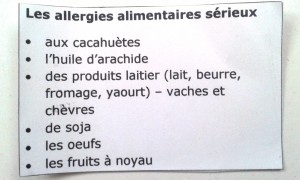Here are my top 10 tips for travelling with an allergic child that I wanted to share after our experience of MyItchyBoy having an allergic reaction on holiday this summer:
1. Agree beforehand who is best equipped to deal with a situation, should it occur – that person should carry all the important documents, or at least be the one who carries the bag with them in. It is best to choose the person most able to communicate in that country if language is an issue.
2. Take several copies of translations of relevant allergens. We printed a couple of A4 sheets and cut them up. That way we could have a copy in every bag, wallet and pocket and it meant that if a waiter took one to the kitchen to talk to the chef and didn’t bring it back, it didn’t matter.
3. Although we took translations of the allergens you want to avoid, we didn’t take translations of the symptoms that MyItchyBoy experienced. At the crucial points in the conversations with medical staff I was desperately searching for vocabulary, which was wasting time and could have made a big difference in how seriously and urgently we were dealt with. Next time I will definitely make sure we have a list of possible medical symptoms as well as emotions (such as ‘upset’, ‘crying’, ‘agitated’, ‘calm’, etc.).
4. If you’re able to find out what the process for medical emergencies in the country you’re visiting, then that could be helpful. However, depending on where you are and the time of day, it may be different. If you don’t know the process or not sure what to do – find someone quickly who does know. What helped us a lot was going to a 4 star hotel quite early on and getting help from the reception staff.
5. Insurance details – make a note of the telephone numbers (including dialling info from the country you’re going to) and policy number. Most insurance companies these days have allergic reactions under their medical conditions online, so have a look at getting covered if your child has previously had a reaction that needed medical treatment. Also, don’t forget the translation for ‘travel insurance’ as well as it may be one of the first things medical staff ask for. Of course, if travelling in Europe, make sure your child has an EHIC card that’s up-to-date and kept with the other documents
6. Child’s passport – keep a photocopy with the insurance details or at least make sure you can access a scanned copy of it online.
7. Keep a pad and pen with any medication so you can write down times of medications given and when symptoms occurred.
8. Epipens – don’t forget to check expiry dates and remember to keep them cool when travelling. An insulated case is a good idea and if they’re in a bag, remember not to leave it in the sun for long periods of time. If you think you or anyone else may need them, take the instructions along too.
9. Make sure your mobile is charged before you go out for the day and never let it run down too much, in case you do need it. Make sure you can use your mobile abroad before you go.
10. Emergency numbers – you don’t need a country code when dialling within that country for emergency numbers but you do need to know what it is. Most mobile phone companies now send a welcome message with the numbers on when you arrive at your destination. Keep the message when it arrives and you will then know where to find it.
Some of these are obvious, some perhaps less so. Either way, I hope that it may help other parents to be prepared when taking an allergic child abroad.
Please let me know of any suggestions you have to add to the list.

